
This January 15th is “Thank Your Mentor Day,” a part of National Mentoring Month. National Mentoring Month was started in 2002 by the Harvard School of Public Health and MENTOR: The National Mentoring Partnership. According to the National Mentoring Month website, the purpose of National Mentoring Month is to focus “national attention on the need for mentors, as well as how each of us—individuals, businesses, government agencies, schools, faith communities and nonprofits—can work together to increase the number of mentors to assure positive outcomes for our young people.”
In recognition of this day, I would like to take some time to reflect upon and recognize the mentors who guided and influenced me. Here are some individuals who played an important role in making me the man that I am. To each and every one of you who made a positive impression on my life, I thank you.
Montrue Doty
The first mentor on my list is Mrs. Montrue Doty. Mrs. Doty was my fourth-grade teacher. She was the first person in my life who taught me to embrace my talents.
Mrs. Doty noticed early into the school year that I was not being challenged by the fourth-grade curriculum, and that I usually tuned out of the class and lost myself in drawing. Being an amateur painter herself, she recognized that I possessed considerable artistic ability and decided to put me on a different track than the other students in the class. Mrs. Doty exempted me from the majority of the daily work in fourth grade, and my experience that year mostly consisted of sitting at a special table in the back of the room and creating oil paintings on canvas while she taught my classmates. When the other students were working on their in-class assignments, Mrs. Doty would come to the back of the room and instruct me on my painting technique.
I consider Mrs. Doty to be my first true art teacher. Before I found myself in her classroom, my art was strictly a self-taught product of pencils and crayons. She introduced me to the real tools of the artist and to advanced techniques that I could not have discovered on my own. She challenged my ability and, in doing so, helped my talent evolve.
Michael Reichle
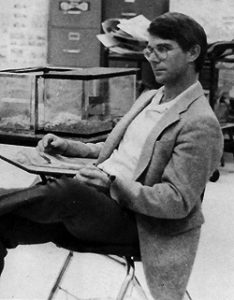 It took five more years before another teacher made such an impression on me. Michael Reichle was my biology teacher during my freshman year of high school. He was the first example I encountered of someone who was truly passionate about his or her life’s work. “I just want to make people more aware of the living world around them, of the living world inside them, and to appreciate what they have – to not take it for granted,” he told me in 1987. “It’s a beautiful world, if you’re just aware of it.”
It took five more years before another teacher made such an impression on me. Michael Reichle was my biology teacher during my freshman year of high school. He was the first example I encountered of someone who was truly passionate about his or her life’s work. “I just want to make people more aware of the living world around them, of the living world inside them, and to appreciate what they have – to not take it for granted,” he told me in 1987. “It’s a beautiful world, if you’re just aware of it.”
Mr. Reichle demonstrated his philosophy in his daily life. He traveled frequently and always sought out adventure, whether it was paraplaning, river rafting, ballooning, or scuba diving. Mr. Reichle didn’t just observe life – he lived it.
From Mr. Reichle, I learned to appreciate the pursuit of knowledge for its own sake and to have a positive, humanistic view of the world. He also inspired my creativity, allowing me to use my assignments as an outlet for my artistic talents.
Mr. Reichle was, without a doubt, the most influential teacher I had in high school. His view of the world was perpetually optimistic and made a lasting impression on me.
“I hope that tomorrow brings something new I don’t know,” Mr. Reichle said. “Something interesting I can learn about. A chance to meet new people, learn how to do new things. I guess just the idea of tomorrow brings new possibilities, and I want to explore them.”
Tom Toulmin
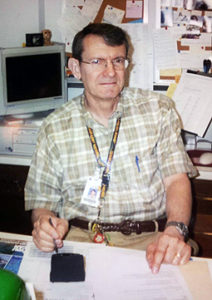 In the same semester that I took Mr. Reichle’s biology class, I also took my first journalism class. My teacher, Tom Toulmin, was a small, quirky man who was equal parts Edward R. Murrow and Ed Grimley.
In the same semester that I took Mr. Reichle’s biology class, I also took my first journalism class. My teacher, Tom Toulmin, was a small, quirky man who was equal parts Edward R. Murrow and Ed Grimley.
Mr. Toulmin came to be my first writing coach and helped me realize that visual art was not the only area in which I possessed expressive talent. From Mr. Toulmin, I learned about style and language, and about the responsibility and the power of words. Mr. Toulmin taught me about the ethics of journalism and the importance of pursuing the truth objectively. His lessons continue to inform my work today, particularly my non-fiction efforts.
Mr. Toulmin also provided me with my first exposure to Apple computers, such as they were at the time. He definitely deserves some extra credit for that.
Reid and Patty Rossmann
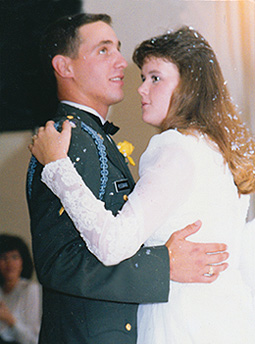 Not all of my mentors were discovered in an academic setting. Reid Rossmann and Patty Perry were high school sweethearts who married right out of high school and, nearly three decades later, are still an example of true love.
Not all of my mentors were discovered in an academic setting. Reid Rossmann and Patty Perry were high school sweethearts who married right out of high school and, nearly three decades later, are still an example of true love.
As a teenager, I lacked older siblings in my home and longed for older role models. Recognizing that, my father asked Reid, whom he knew from work, to spend time with me. Reid and Patty happily took on that role in my life as I was just entering high school. They created a safe, non-judgmental environment for me to emerge from my naturally introverted world at a time when socializing and building relationships was so important.
Reid and Patty took me out for fun and introduced me to other people. They provided sage advice and guidance in everything from relationships to drinking (i.e. never eat ice cream and beer at the same time). They were the big brother and sister that I needed, and they taught me to have fun and enjoy life. From these two people I learned that you could be unapologetically and unabashedly happy.
Boyd Thomas
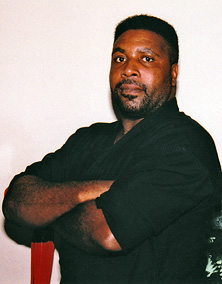 While Reid and Patty helped provide me a proper grounding through my teen years, there were still lessons left for me to learn. Boyd Thomas became my next guide in life. A decade older than me, Boyd and I met as students at the Art Institute of Dallas and worked together as professional sculptors for a time.
While Reid and Patty helped provide me a proper grounding through my teen years, there were still lessons left for me to learn. Boyd Thomas became my next guide in life. A decade older than me, Boyd and I met as students at the Art Institute of Dallas and worked together as professional sculptors for a time.
It was as classmates that I casually mentioned to Boyd my desire to study martial arts. Perhaps it was fate or just serendipity, but Boyd, a second-degree black belt in Shotokan karate and a former competitive tournament fighter, offered to teach me. After several other young men in our class mentioned an interest in joining us, we began twice-weekly classes in the backyard of his home.
The martial arts training proved to be exhausting, often brutal, and constantly challenging. In each training session, Boyd reminded us that he was “old school” and not “new school.” His goal was to take us “past our limits,” and this meant working out to physical exhaustion, through injury, and regardless of the elements. It also meant that the bulk of our training involved sparring, and, to that end, Boyd brought in more seasoned martial artists to spar with us. Advancing in his program was the hardest, most challenging thing that I had done up to that point in my life, but the sense of accomplishment was unmatched and gave me the confidence and the foundation to set future goals and achieve them.
Eventually, our group of eight or nine students began to dwindle, as others lost interest or dropped out due to the physical demands and full-contact fighting. In the end, only I remained as Boyd’s student. By that point, we had also become friends.
Boyd wasn’t simply my primary martial arts instructor, he was my guide into full adulthood. Our lessons became equal parts about fighting and being a man. Boyd taught me how to have pride in myself, to conduct myself with dignity while also being assertive and demanding respect. Boyd taught me how to navigate the world as a man and as an adult.
While I moved on from the world of commercial sculpting to further my education and focus on writing, Boyd continued as a professional sculptor and distinguished himself in his chosen field. I profiled Boyd in a previous article, which you can read here.
Joe Barnhart
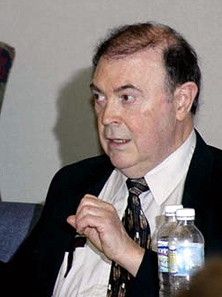 After leaving the world of commercial sculpting behind, I enrolled in the University of North Texas to pursue a degree in creative writing and philosophy. It was there that I found myself in the class of my next mentor and the single most influential professor of my undergraduate experience, Dr. Joe Barnhart.
After leaving the world of commercial sculpting behind, I enrolled in the University of North Texas to pursue a degree in creative writing and philosophy. It was there that I found myself in the class of my next mentor and the single most influential professor of my undergraduate experience, Dr. Joe Barnhart.
Dr. Barnhart was a tenured professor of philosophy at the university. I had the good fortune to take his class on existentialism. It left an impression upon me that was unmatched by any other undergraduate class.
Dr. Barnhart gave me my philosophical direction; he introduced me to the great existential philosophers, such as Dostoevsky and Kierkegaard, both of who considerably influenced my worldview. A Dostoevsky scholar, Dr. Barnhart provided the best literary analysis of any work of literature that I experienced in any of my classes (and I was an English major) when we took on a months-long study of Dostoevsky’s Brothers Karamazov.
More than simply teaching me about philosophy, Dr. Barnhart taught me how to think and reason; he taught me how to develop questions and then seek the answers to those questions. He also taught me how to see subjects from an opposing viewpoint. Perhaps most importantly, he taught me to share ideas and perspectives and not be afraid of criticism.
Regarding the issue of criticism, I vividly recall a story he related to me of a philosophical conference he attended with his daughter. At the conference, he presented and defended a paper. In the discussion that followed, another philosopher argued strongly against Dr. Barnhart’s conclusions. On the way home, his daughter asked him if he was upset by the other philosopher’s attack. “Not at all,” he told her. “To be a philosopher is to accept and embrace open dialogue and the inevitable differences of opinion. His arguments help me to hone my own, to make my position stronger. His arguments are the whetstone upon which I sharpen my razor.” In relating this story to me, he imparted one of the most important lessons of my academic career.
Dr. Barnhart, in addition to his academic writing, also wrote fiction influenced by philosophy. When he wrote a sequel to Brothers Karamazov, Dr. Barnhart asked me to edit and provide a literary critique for him. I was honored to do so.
A few years after I graduated with my undergraduate degree, Dr. Barnhart retired and moved to Tennessee. After his move, I lost touch with him until one morning in 2008. On that morning, I heard his familiar voice on the television as I was getting dressed for work. I turned to see my old professor being interviewed on The Today Show as one of the wounded survivors of a church massacre in Tennessee. A gunman walked in on Sunday service and shot nine people, killing two, including Dr. Barnhart’s longtime friend and writing partner.
I sent flowers to the hospital where he was recovering, and soon thereafter he called to thank me for the flowers and to catch up. It gave me the opportunity to express to him the influence he had on me, a moment I will always treasure.
In 2011, Dr. Barnhart wrote a letter of recommendation for the application to my current doctoral program. I am there now because of Dr. Barnhart, in more ways than one.
“You try to teach your children and students to think critically and apply it in every field,” Dr. Barnhart told a reporter in 2000. Mission accomplished.
John Little
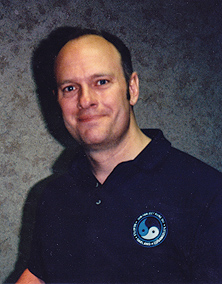 I came to know John Little in 1999 while conducting research for my first book, a biography of Bruce Lee. At the time, he was the director of the Bruce Lee Educational Foundation and the literary executor of the Bruce Lee Estate. Little had earned his bachelors degree in philosophy and we immediately found a number of common interests. Unlike the majority of Bruce Lee fans, we were more interested in Lee’s philosophical and intellectual mind rather than his martial arts prowess or performances on film.
I came to know John Little in 1999 while conducting research for my first book, a biography of Bruce Lee. At the time, he was the director of the Bruce Lee Educational Foundation and the literary executor of the Bruce Lee Estate. Little had earned his bachelors degree in philosophy and we immediately found a number of common interests. Unlike the majority of Bruce Lee fans, we were more interested in Lee’s philosophical and intellectual mind rather than his martial arts prowess or performances on film.
With our shared interests, John and I often talked for hours about the greatest minds and ideas of all time, whether those minds and ideas were in the fields of philosophy, psychology, science, or the arts. For a long time, he was the only person in my circle of friends with whom I could have those types of conversations. John shared a number of his philosophical influences with me, and they would often become my own influences. His enthusiasm for great minds was infectious, and his taste in influences was excellent.
After the release of my first book, I began to work closely with John on a number of Bruce Lee-related projects. In 2004, John Little left the Bruce Lee Educational Foundation to become the literary executor for the estate of the Pulitzer Prize-winning historian and philosopher Will Durant. I followed him, where we established the Will Durant Foundation and worked on a number of creative projects to perpetuate Durant’s memory.
John was one of my best writing instructors, because he not only gave me the occasional writing advice, he taught me about the practical and business ends of the profession. John showed me, through his own example, the reality of writing for a living – both the good and the bad. He taught me that, in order to be a full-time writer, there was a necessary trade off of financial security (something of which the majority of readers are oblivious) and that you sometimes had to write things to pay the bills, regardless of whether you were passionate about them.
John Little was also a man of multiple talents, like myself, and he served as an example of someone who successfully utilized all of them in his professional life. In addition to making a living as a writer and editor, John was a successful documentary film director and songwriter.
A self-described “inveterate hero worshipper,” John Little taught me how an appreciation for remarkable people can rise to the level of scholarship. His guidance further fed my interest in gifted and talented people.
Bobby McLawhorn
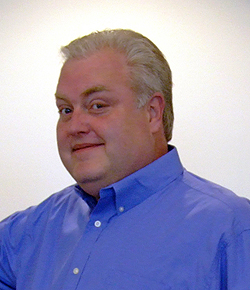 I met Bobby McLawhorn in 2003 when I began working at the corporate headquarters of a major retailer. I had been a community college instructor for a few years but, recently married, needed a full-time job that provided an adequate salary and benefits package. A job in the training department of this retailer seemed a good opportunity.
I met Bobby McLawhorn in 2003 when I began working at the corporate headquarters of a major retailer. I had been a community college instructor for a few years but, recently married, needed a full-time job that provided an adequate salary and benefits package. A job in the training department of this retailer seemed a good opportunity.
Bobby was the director of training for the department and had been with the company for nearly two decades. Gregarious and outgoing, Bobby’s amiable personality and Kentucky-bred, folksy disposition endeared him to almost everyone whom he met. He and I immediately hit it off.
Bobby McLawhorn affirmed my belief in the fundamental difference between an education and a degree. He had no college degree, but he was one of the smartest people I ever met. We could talk on just about any subject, and Bobby would demonstrate a command of that subject that would be the envy of any academic. History, in particular, was a favorite topic of our conversations.
Bobby McLawhorn also appreciated talent. He was a gifted musician and songwriter who worked in Nashville as a young man and understood the artistic drive. We often talked about the creative process and collaborated on a number of multimedia projects. Bobby encouraged me to use my talents and allowed me to shine in my work.
Over time, I realized that I was unhappy working for the company. I did not find the work fulfilling and, worse, the business model of the company was predicated on exploiting the poor, which weighed on my conscience. While I wanted to leave, the country was in the throes of a deep recession and I felt fortunate just to have a job.
Bobby taught me how to navigate the business world without losing my soul. He was the second major mentor in my life who was always positive and that was particularly helpful in that progressively deteriorating environment. For example, Bobby championed my own return to graduate school and ensured that the company helped pay my tuition. If I wasn’t happy with my job but couldn’t leave, Bobby suggested, at least I could use the time and benefits available to me to prepare for the next phase of my life.
Bobby was an outlier in the office. In an environment where managers exploited their subordinates and coworkers tried to advance at each other’s expense, Bobby treated everyone with respect and fought for the employees under his guidance – often at personal expense. At the same time, Bobby was not immune to the environment and found himself repeatedly passed over for opportunities in favor of newly-minted MBAs and corporate hustlers.
When the internal culture of the company began to churn in the interests of corporate “evolution,” loyal and lifetime employees were dismissed. Bobby McLawhorn found himself among them.
Bobby adapted to his circumstances with dignity and class, turning a setback into an opportunity. A smart man who planned well for the future, he had amassed a portfolio of assets in his adult life that made him, at least on paper, a millionaire. While the company to which he devoted most of his adult life no longer employed him, he had no financial need to work. Instead, this millionaire took the opportunity to enroll in college, to earn the degree he always wanted, but for which he never had the time.
Today, Bobby McLawhorn is a junior at the University of Texas at Dallas, where he is studying psychology. His plan is to ultimately earn his doctorate in clinical psychology. This middle-aged man currently rocks a 3.95 GPA and a head full of dreams.
I was not built for that world, but I found Bobby McLawhorn in it, and that made it bearable for a time.
Todd Kettler
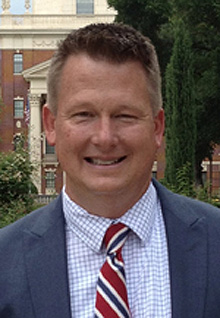 My most recent two mentors are helping to chart the next phase of my career and the second half of my life. The first of these, Dr. Todd Kettler, is one of my professors in the field of Gifted and Talented education.
My most recent two mentors are helping to chart the next phase of my career and the second half of my life. The first of these, Dr. Todd Kettler, is one of my professors in the field of Gifted and Talented education.
Dr. Kettler joined the department of Educational Psychology at the University of North Texas during my second year of doctoral studies. Although Dr. Kettler is a seasoned professional in the Gifted and Talented field, he earned his own doctorate only a month before joining our department. His recent experience is a helpful example of a working adult pursuing the dream of a terminal degree.
A former philosophy student, Dr. Kettler and I share a love of wisdom. His classroom is a model of the Socratic dialectic and representative of Aristotelian logic. During each of his classes, one can’t help but feel that, if you close your eyes, you can easily imagine yourself in the Athenian Lyceum of Ancient Greece.
Dr. Kettler demonstrates to me what it truly means to be a scholar in your chosen field. He is prolific with his studies and publications and is always generating new research questions. He stays abreast of the latest literature in the field and is an active participant in committees and panels. Dr. Kettler has high expectations for his students and ensures that I perform at a level commensurate with my end goal. He is exacting in his requirements and detailed in his critiques.
Dr. Kettler stresses the value of developing relationships within the field of Gifted and Talented education and makes an effort to introduce me to other professionals at conferences and symposiums. His connections created connections for me and that has been invaluable.
An aesthete with a wide range of artistic interests, Dr. Kettler is particularly passionate about literature and reignited my own love of literary fiction, encouraging me to occasionally lift my head out of the world of textbooks and psychological studies to enjoy a good novel.
Most importantly, Dr. Kettler represents the model of a person who navigated his own world to achieve a profession that aligns with his passions. “Sometimes I sit in this office and I can’t believe I am here getting paid to do what I love,” he once told me. “Don’t tell the administration, but I would probably do this for free.”
Anne Rinn
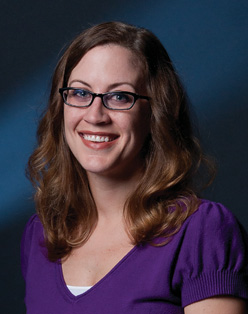 Dr. Anne Rinn has been my doctoral advisor for more than three years, since I began studying Gifted and Talented education. I consider myself fortunate to enter doctoral school at just the right time, becoming the first student in the new program. Dr. Rinn, as its coordinator, was excited to be building the program and it was very easy to become swept up in that excitement.
Dr. Anne Rinn has been my doctoral advisor for more than three years, since I began studying Gifted and Talented education. I consider myself fortunate to enter doctoral school at just the right time, becoming the first student in the new program. Dr. Rinn, as its coordinator, was excited to be building the program and it was very easy to become swept up in that excitement.
Dr. Rinn became my first mentor in the doctoral program and remains the principal person in that role. It was she who took me to my first major conference, the 2011 National Association for Gifted Children’s annual conference in New Orleans, even paying for my trip with grant funds available to her. It was there that I decided to make working with the gifted my counseling specialization.
I am blessed by the fact that Dr. Rinn and I share a research interest in the emotional and social well being of gifted children and adults. That fortuitous connection meant plenty of opportunities to learn about a facet of giftedness that is given little attention by most other professors. It also allowed us to collaborate on a few research studies.
Dr. Rinn understands my personality and perspective; she grasps the emotional and psychological world I live in like few others can. She has modeled life as an introvert in academia, showing me, by her example, that introversion isn’t necessarily an impediment to success in academia, as it often is in the corporate world. She has also helped me to understand that I could creatively incorporate my past work, experience, and interests into my current research.
Currently, Dr. Rinn and I are collaborating on a couple of interesting book projects. And with my doctoral classes behind me and dissertation on the horizon, Dr. Rinn now sends me notices of faculty opportunities that might interest me. She also recommends me for speaking engagements.
While I may be just a year or two away from completing my doctoral program, I suspect that Dr. Rinn will remain a presence in my professional life for many years to come.
To learn more about Thank Your Mentor Day and National Mentoring Month, visit the website at www.nationalmentoringmonth.org.

I am beyond flattered! So glad that we could be there for you.
I’m so proud of the man that you became.